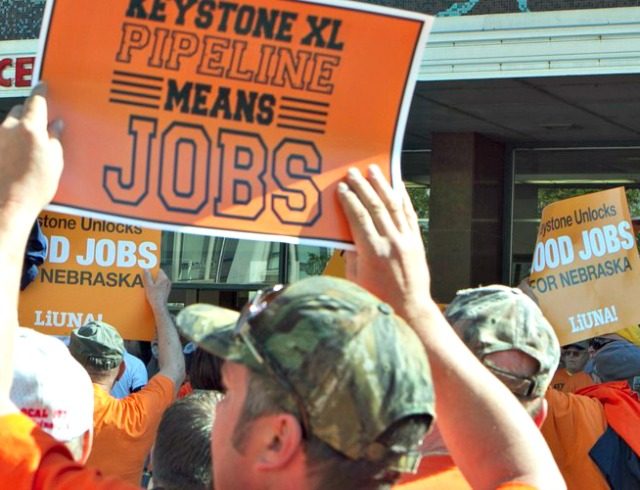Dozens of people gathered to show their support for the final construction of the Keystone XL pipeline in Nebraska as the Public Service Commission in Lincoln began hearings today on the final regulatory hurdles that need to be cleared to complete the project.
“I’m here to tell you there is a silent majority in the hills who want this built,” former State Speaker Mike Flood told the supporters.
An agreement with TransCanada, the energy infrastructure company that owns the project, specifies that most of the jobs created by the pipeline will go to local workers, local television station KETV reported on Monday.
“It’s a good opportunity for our members,” Sam Renshaw of labor union Local 1140 told KETV, adding that the work will help local people raise their families.
Also on Monday TransCanada posted an article titled, “5 Reasons to Support Keystone XL,” including creating jobs — Montana: 3,700, South Dakota: 3,500, and Nebraska: 4,500. The project would also support more than 42,000 direct and indirect jobs nationwide.
The pipeline also would generate $3 billion towards U.S. GDP, according to TransCanada.
5 reasons to support the #KeystoneXL project: https://t.co/JzsYRn2nIj #TimetoBuildKXL pic.twitter.com/UBUX1zfdPf
— TransCanada (@TransCanada) August 7, 2017
The Associated Press reported that about 60 people attended the hearing at a Lincoln hotel and noted that “a digital billboard truck circled the block outside, flashing anti-pipeline messages.”
“The 1,179-mile crude oil pipeline has faced relentless criticism from environmental groups, Native American tribes and a well-organized minority of Nebraska landowners who don’t want the project cutting through their property,” AP reported, adding that business groups and unions support it because it would create jobs and property tax revenue for local governments.
AP also reported that an attorney for the landowners who oppose the pipeline “grilled” a TransCanada official at the hearing.
“The commission should know that this route, if they want to permit it, doesn’t have to be perpetual,” Dave Domina said. “It can be time-limited so the land can go back to the families.”
TransCanada’s Tony Palmer said the company would pay for cleanup and restoration costs but might seek compensation from anyone who damages the pipeline.

COMMENTS
Please let us know if you're having issues with commenting.